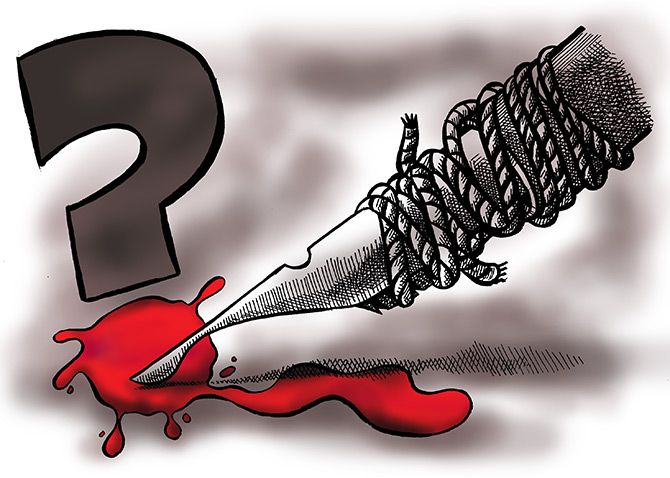Geetanjali Krishna explains why this may slow down India's fight against corruption.
Illustration: Uttam Ghosh/Rediff.com

With almost 6 million RTI applications filed every year, India's Right to Information Act is the world's most extensively used transparency legislation.
However, the government’s proposed amendments to the RTI Act threaten the very foundations of this empowering law.
In April 2017 the government put out a set of Draft Rules proposing amendments to the RTI Act.
They include permitting the withdrawal of appeals based on a written communication by the appellant and the closure of an RTI query upon the death of the appellant.
This means information seekers could be browbeaten into withdrawing applications.
Also, if the death of an appellant leads to the automatic closure of the RTI query, information seekers and whistle-blowers will be even more vulnerable to assault than they already are.
Another proposed amendment allows central and state governments to fix the salaries of the information commissioners which have so far been on a par with those of the officials of the Election Commission.
"If the government decides the salaries of ICs the independence of the commissions could be compromised," says Anjali Bhardwaj of Satark Nagarik Sangathan, a citizen rights body based in Delhi.
A March 2018 study on the efficiency of India's State Information Commissions conducted by SNS and the Centre for Equity Studies gives insights into the problems that beset the RTI mechanism.
The Act lays down that an RTI query is to be replied to within 30 days of its receipt by the IC.
However, the study found that if a query were to be filed in West Bengal today, it would be addressed only in 43 years!
RTI campaigner Amitava Choudhury filed an RTI application in 2008 seeking information on appointments under the West Bengal College Service Commission.
When he did not get a reply, he filed a complaint in 2009. That complaint was heard only this year. He is still awaiting the information he asked for.
Mahiti Adhikar Gujarat Pahel, which operates an RTI helpline in Gujarat, estimates that barely three out of 10 queries they help citizens file get a reply within the stipulated 30 days.
"The rest go into first and second appeals. In many cases, the delay in receiving information makes it impossible to effectively address the issue," says MAGP's Pankti Jog.
Adds Amrita Johri of Rozi Roti Adhikar Abhiyan, a network of organisations in Delhi which work in the field of food security, "We come across dozens of people suffering because of the delay in receiving information under the RTI law."
Many of the RTI applications, especially those related to government social security entitlements, need not have been filed at all had the public authorities disclosed the information suo motu as stipulated under Section Four of the RTI Act.
As Bhardwaj points out, "As many as 70 per cent of the RTI applications relate to information that should have been proactively provided under Section 4 of the RTI Act."
Often, RTI queries are rejected on the grounds that the information, if revealed, could endanger national security, personal privacy, copyright and other such rights listed under Sections 8, 9, 11 and 24 of the law.
However, in its annual report of 2016-2017, the Central Information Commission states that 35 per cent of applications were rejected for reasons listed under 'others'.
"Given that the other reasons listed encompass all the limitations to information as laid down by the law, one can only wonder why 35 per cent of the RTI applications were rejected," says Johri.
Delayed appointments to the State Information Commissions is one of the biggest reasons for the high pendency rates of RTI queries.
The SNS-CES study found that the State Information Commissions of Maharashtra, Nagaland and Gujarat were functioning without a Chief Information Commissioner during the period of the study.
"SICs in Kerala and Odisha were working without their full quota of commissioners," says Johri.
"This means that people seeking information from public authorities have little recourse to the independent appellate mechanism if their right to information is violated."
Activists also question the practice of appointing retired bureaucrats as Information Commissioners.
"In West Bengal, for example, the State Chief Information Commissioner retired as chief secretary of the state," says Amitava Choudhury. "Can they, with their close ties to the bureaucracy, be impartial?"
Activists believe that the problems can easily be solved if there is the political will to do so.
Till then, India's campaign against corruption could slow down to a crawl.










